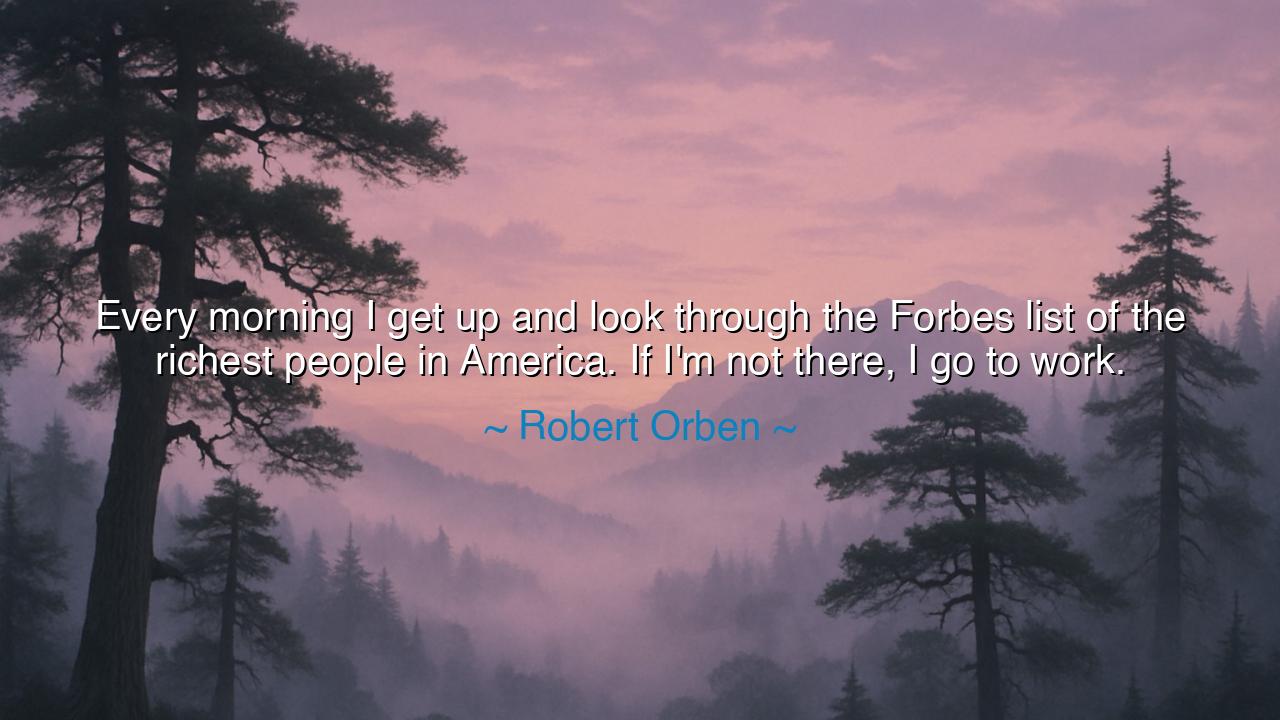
Every morning I get up and look through the Forbes list of the
Every morning I get up and look through the Forbes list of the richest people in America. If I'm not there, I go to work.






Robert Orben, a man of wit and sharp humor, once gave the world this saying: “Every morning I get up and look through the Forbes list of the richest people in America. If I'm not there, I go to work.” At first glance, it draws a laugh, as if it were only a jest about wealth. Yet beneath the surface, like many words spoken in humor, it carries a wisdom both practical and profound. For what Orben truly speaks of is the discipline of labor, the humility of persistence, and the eternal truth that greatness is not gained by wishful dreaming but by the daily act of rising and striving.
For the ancients knew that wealth, honor, and success are never bestowed in idleness. The farmer cannot merely gaze upon his barren field, longing for harvest, and expect fruit to appear. He must rise with the dawn, till the soil, cast the seed, and sweat beneath the sun. So too does Orben remind us that while men may look upon the Forbes list or upon any measure of greatness, the true test is what they choose to do when their names are not found there. To rise and labor is nobler than to sit and pine.
Consider the story of Andrew Carnegie, who arrived in America a poor boy, working in a cotton factory for pennies. He was not on any list of greatness in his youth, nor did fortune smile upon him without effort. But day by day, year by year, he worked, he learned, he seized opportunities. In time, he became one of the richest men of his age, yet he never forgot the discipline of labor. Orben’s words echo this truth: greatness is not a sudden gift, but the fruit of steady toil.
Yet there is also humor in Orben’s wisdom, and humor itself is a teaching. By laughing at the idea of checking for his name among the rich, he teaches humility. He admits he is not yet there, and perhaps never will be. But instead of despairing, he chooses action. His joke hides a greater virtue: the refusal to surrender to envy or self-pity. Instead of lamenting, he goes to work. And in this lies the wisdom of the ages—that one who endures in steady labor may yet surpass the dreamers who wait idly for fortune to arrive.
We must also see the deeper symbolism: the morning ritual itself. To awaken each day and measure oneself against greatness is a reminder of what one seeks. But the act of continuing in discipline despite not yet achieving it is the true source of strength. In this rhythm of checking, acknowledging, and working, Orben outlines a path not of arrogance, but of perseverance. It is the ritual of the craftsman, the athlete, the scholar—each day renewed, each day reminded, each day set again to labor.
The lesson for us, then, is this: do not despise the distance between where you stand and where you wish to be. Let it be fuel. Look upon the list of those greater, whether in wealth, wisdom, or honor, and if you do not find your name there, do not despair—rise and work. For every master was once a beginner, every rich man once poor, every hero once obscure. What separates them is not fate alone, but the willingness to labor when others would complain.
Therefore, I say to you: do not waste your mornings in idle longing. If your name is not yet found among the mighty, let that absence sharpen your resolve. Set your hands to your task, your mind to your discipline, your heart to your labor. And whether fortune crowns you with wealth or not, you will have lived nobly, as one who did not wait for greatness but built it with your own strength.
For in the end, Orben’s jest reveals a truth as old as humanity: dream, but do not linger in dreams. Rise, and work. The list may or may not bear your name, but your deeds will. And in the book of life, it is not wealth alone that is remembered, but the courage of those who endured in labor, day after day, until the end.






AAdministratorAdministrator
Welcome, honored guests. Please leave a comment, we will respond soon